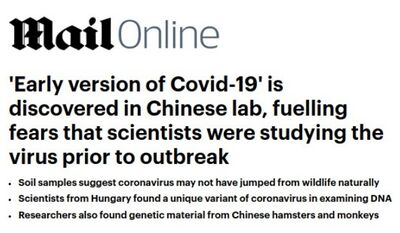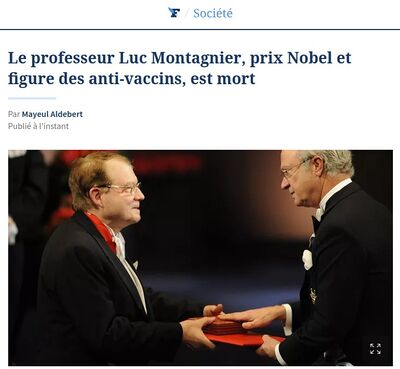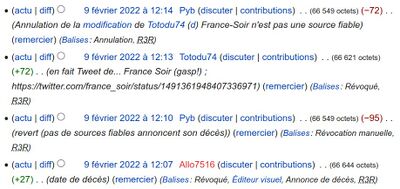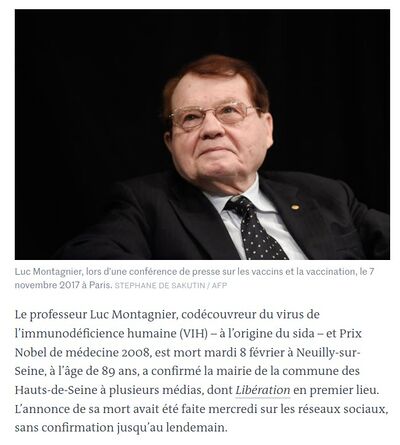It is now confirmed by mainstream media that Prof. Luc Montagnier, discoverer of the RNA replication mechanism and awardee of the Nobel prize for his work on the HIV, passed away two days ago. The information has been broken and circulated in a timely manner by France-Soir, which triggered either condemnation of the claim as fake or an embargo on its diffusion. This allowed a quite unique circumstance of a popular tribute by admirers of the character unpolluted by politicians and the authorized press, de facto silenced by their incompetence.
On the day where it is reported that the lab origin of the virus now has direct evidence to support it, with "fear that scientists were studying the virus prior to outbreak", one can only humbly accept this lesson from beyond the grave made by one of those who are the first to be right [1], and who get ostracized or demised for this reason: we should be ready to hear more than one voice.

The so-called mainstream media have been forced to demonstrate, in the open, how sluggish they are, how unable they can be to establish a simple fact for certain. Does it really take two days to confirm the death, in a Parisian hospital, of a prominent personality, not to say worldwide celebrity? Don't these journalists have trusted sources, informants, contacts? If they are so utterly unable to catch up, not within minutes, or hours, but entire days, behind other sources which proved to be correct and well-connected, thereby tipping them off, what can we expect in the face of other allegations regarding much more sensible and important issues at the confines of the globe? The mainstream media have betrayed both their considerable limitations as well as their obsolescence.

New-Zealand's PM, Jacinda Ardern recently treated everybody with an Orwellian outing by declaring, seriously, and on several occasions, including official ones, that she was the single-source of truth [2]. The French counterparts of this monopoly of true information having failed to provide any useful input concerning this fact for over two days, was Montagnier still alive all this time? Was the mourning, tributes, contemplation that have been expressed by thousands, was it undue, mistaken, inappropriate? Should people wait for the authorization and notice of the government or stamped newspapers to express their sorrow, to pay their homage? Or is it possible that alternative, and sometimes better informed, better-able sources of truth do exist? And if they do, what right is there in censoring them a priori, in systematically denying them credibility even on points where they likely have one (Montagnier was close to the journal)? Wikipedia on this occasion illustrated how a source could rapidly grow from unreliable (on which account?)

to complotist:
As for Le Monde, the reference journal, in another Orwellian cliché, it directly presented the facts in such a way as to erase the original source (which is not named) and denying its right to have its information confirmed (which have been, presumably by the best authorized and most direct possible sources, unlike the city hall for the rest of the press).

It is also notable that these "official sources of truth" all come out simultaneously, together, all saying basically the same thing, all agreeing with each other, each justifying a bit more the other, the infamous "consensus".
It is very likely that Montagnier himself, in a didactic and striking lesson from the great professor that he was, taught us beyond the grave, by leaving instructions to boycott mainstream media which are more propaganda machines than information relays, teaching us that we should not trust, respect or buy this consensus. In this sortie with which he graced himself, clean from the protocol, away from the beaten track, far from the ordinary, he has demonstrated, how brilliantly, that truth is what it is, what there is, not where the information comes from. The paths to access truths are circumvolved and sometimes unpleasant, often unexpected. We just had a beautiful demonstration that one's relation to it can never, ever, be entrusted to a "single-source of truth".